PROGRAM SCHEDULE 2012-2013
26th Season
| Sun |
Sep |
16 |
2:00 |
Remembering Glenn Gould
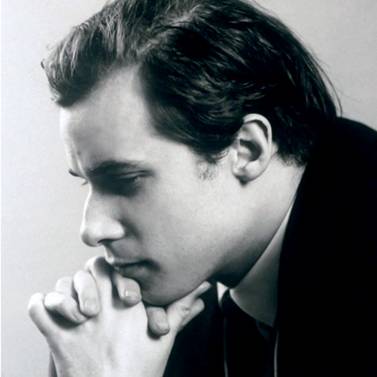
2012 marks the 80th anniversary of Glenn Gould’s birth and the
30th anniversary of his death. Toronto is celebrating the life of
a man who was arguably one of the most exciting musical visionaries
of the 20th century. The city is alive with a number of other
festivities this September and we are pleased to present a program
highlighting a few recordings which are considered landmarks of the
industry. In addition, there will be some special surprise features.
Join us and share your own memories and experiences of Glenn Gould.
(ta&js/ta&js)
|
| Sun |
Oct |
21 |
2:00 |
Ástor Piazzola (1961-1992)
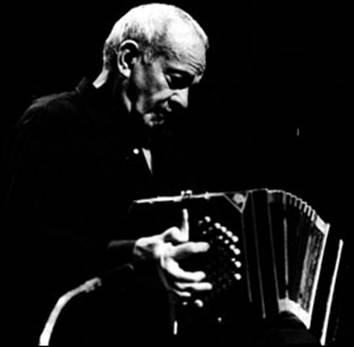
Tango, which began its life in the brothels of Buenos Aires,
lives vibrantly today thanks to the efforts of Ástor Piazzolla
(1921–92), an Argentine composer and bandoneón player.
Incorporating elements of both classical music and jazz,
he revolutionized traditional tango into a new style termed
nuevo tango.
Piazzolla’s music fascinated so many other fellow-musicians
across many genres, including respected artists from the
classical music world such as Yo-Yo Ma and Gidon Kremer,
who performed and recorded his work. Indeed, original
Piazzolla works have been commissioned by or for them.
Our program will consist of audio and video recordings with
performances by Piazzolla himself as well as by artists who
have made his works a central part of their repertoires.
(js&ta/js&ta)
|
| Sun |
Nov |
18 |
2:00 |
In Memoriam Dietrich Fischer-Dieskau (1925-2012)
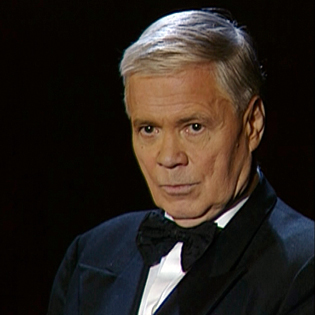
Dietrich-Fischer Dieskau was one of the greatest and most
influential singers of the 20th century. Few singers have managed
the range and versatility of his repertoire. Each of his
interpretations is characterized by a very individual precision
and deep insight. But, while many of his operatic and oratorio
interpretations are unsurpassed, it is in the field of the
German lied that Dietrich Fischer-Dieskau made his deepest mark.
He, more than any other singer, with the possible exception of
Elisabeth Schwartzkopf, can be credited with making the art song
as popular as opera and oratorio, and enabling the present
generation of singers to build their careers on the art song
repertoire. This programme will present a small cross-section of
Dietrich Fischer-Dieskau’s interpretative art.
(jn/jn)
|
| Fri | Dec | 7 | 6:00 | Christmas Party

Each year, the Classical Music Club Toronto holds a Christmas party for members and their guests. We hold the party to a FRIDAY night because Saturdays in December tend to be fully booked for many of the Classical Music Club Toronto members.

Details of location and how to RSVP are provided to members via electronic or traditional mail. This is a 'Pot Luck' party. To avoid duplicates, in your RSVP indicate the food you intend to bring. Your friends are welcome. Please bring your own drinks.
ANNUAL CD EXCHANGE: Please wrap a CD you would like to share with other members.
(/ta&js)
|
| Sun |
Jan |
20 |
2:00 |
Giuseppe Verdi: Bicentennial Celebration (Part 1)
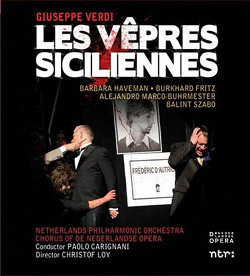
2013 is the bicentennial of two great operatic giants—Giuseppe Verdi and
Richard Wagner. On the global scale, the international celebrations have
already started, such as La Scala’s season opening on December 7, 2012,
with Wagner’s Lohengrin. CMC is not an exception. We offer two programs
each for these composers whose works will forever remain the best of
opera theatre.
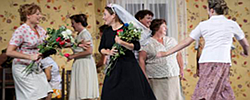
Giuseppe Verdi lived through the period of the Risorgimento, the independence
and unity movement in Italy. The accompanying wars burned cities and killed
thousands of people at the same time Verdi’s operas were premiered. We will
look into operas, such as I Vespri Siciliani and Simon Boccanegra, which are
performed relatively less often but have recently been revived as standard
repertory. Stimulating stagings will also reveal the hot-blooded, patriotic
nature of Verdi’s music which in the 21st century is brought to a high level
of universal humanism.
(ta&js/ta&js)
|
| Sun |
Feb |
24 |
2:00 |
Pinchas & the Concerto (Program 3)
Experience some of the greatest music ever written for the violin
through the ears of one of the finest violinits of our time as Pinchas
Zukerman gives studio demonstrations and discusses these works with
Eric Friesen.
In this series of five programs, each program will feature two
one-hour presentations. In the first half of Program 3 we will hear
Beethoven's Violin Concerto in D Major, Opus 61. The first movement is played
by Pinchas Zukerman with the Los Angeles Philharmonic conducted
by Zubin Meta. The second movement is played by Isaac Stern with
the New York Philharmonic conducted by Leonard Bernstein. In the
third movement, we have again Pinchas Zukerman with the Los Angeles
Philharmonic conducted by Zubin Meta.
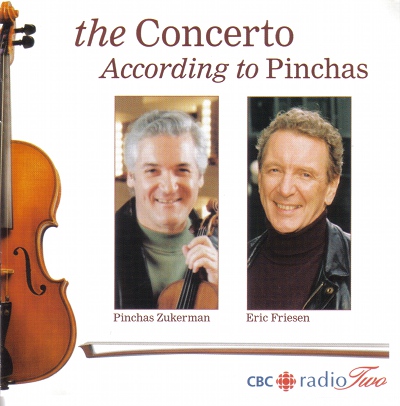
After the break, we will hear the Brahms Violin Concerto in
D Major, Opus 77. The opening of the first movement is played by
David Oistrakh with the Cleveland Orchestra conducted by George Szell.
The first movement cadenza will be played once by Pinchas Zukerman
with the Orchestre de Paris conducted by Daniel Barenboim, then again
by Fritz Kreisler in a 1927 recording. The second movement will be
played by Pinchas Zukerman with the Orchestra de Paris, conducted by
Daniel Barenboim. Finally, the third movement will be played by
Gil Shaham with the Berlin Philharmonic, conducted by Claudio Abbado.
(bc/bs)
|
| Sun |
Mar |
17 |
2:00 |
Nikolaus Harnoncourt
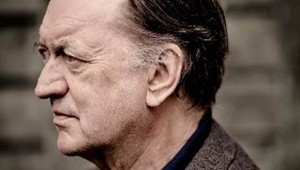
Austrian conductor Nikolaus Harnoncourt was born in Berlin, Germany
in 1929 and was raised in Graz, Austria. He is particularly known for
his historically informed performances (HIP). At the start of his
career, he worked as a cellist in the Vienna Symphony, playing a wide
range of repertory from Bach to Stravinsky. Harnoncourt wondered:
Why do the performances become so boring every time they play pieces
by the composers Bach and before? Why does the music of earlier periods
appear unexciting while other art forms such as painting and literature
from the same period keep their charm for the contemporary public?
First, he founded his own period instrument ensemble Concentus Musicus
Wien in 1953, and became a pioneer of the Early Music movement. Around
1970, Harnoncourt started to conduct opera and concert performances,
soon leading renowned international symphony orchestras, and appearing
at major concert halls, operatic venues, and festivals. His repertoire
has since widened to include composers of the 19th and 20th century.
Through his recordings Harnoncourt struck us by his refreshing, immediate
expression. It was a true shock to encounter his recordings of Mozart
symphonies, No. 25 in particular, with the Concertgebouw Orchestra.
Another example of his impressive work is the Monteverdi series with
Jean-Pierre Ponnelle at Zürich Opera. The trilogy toured around Europe
in the late 1970s and its huge success resulted in the wonderful UNITEL
video recordings. These performances abound in the edgy contrast between
the joy of life and deadly grief, tremendous sensuality and comic humor.
Through his interpretation all these pieces are suddenly filled with a
richness we previously had not considered to be a part of “pure”
compositions. It may have been a process of regaining and rediscovering
the humanity in the music.
The program includes his video appearances in the Mozart year 2006.
(js&ta/js&ta)
|
| Sun |
Apr |
21 |
2:00 |
Brahms's German Requiem
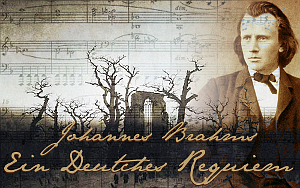
Those who know the New Testament well will recognize the first line
of the German Requiem (“Blessed are those who mourn, for they shall be
comforted”) as the second Beatitude from Christ’s Sermon on the Mount.
However, neither the word “Jesus” nor “Christ” appears
in the Biblical texts chosen by Brahms himself for this great work. Brahms must
have known his Protestant Bible very well, selecting passages from the Old
Testament (the Prophets, Psalms, Revelation) and the New Testament Gospels
to suit his thematic purposes. This is not the traditional Catholic Mass
for the Dead (recited or sung in Latin); rather, it is a message of comfort
for the living (“those who mourn”) sung in German. Brahms wrote:
“As for the title, I must admit I should like to leave out the word
‘German’ and refer instead to ‘Mankind’.”
He thought of this work as a Human Requiem.
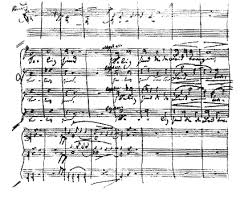 By avoiding direct reference to Christ, Brahms is able to comment
profoundly on the universal subjects of life and death, of joy and
sorrow in a non-liturgical way. The work, divided into 7 movements,
displays a high degree of structural symmetry. According to one critic,
there is a division into two basic parts: “Movements I-III give
voice principally to mourning and the lament over the transience of
earthly existence, while sections V-VII show the transformation of
mourning into faith and the joyous certainty of eternal life.”
The 4th movement, which is a description of Paradise (“How lovely
is Thy dwelling place, O Lord of Hosts”), is serene yet energetic,
and serves as the tranquil heart of the entire work. Textural and musical
parallels and contrasts also exist between sections I and VII, II and
VI, III and V.
By avoiding direct reference to Christ, Brahms is able to comment
profoundly on the universal subjects of life and death, of joy and
sorrow in a non-liturgical way. The work, divided into 7 movements,
displays a high degree of structural symmetry. According to one critic,
there is a division into two basic parts: “Movements I-III give
voice principally to mourning and the lament over the transience of
earthly existence, while sections V-VII show the transformation of
mourning into faith and the joyous certainty of eternal life.”
The 4th movement, which is a description of Paradise (“How lovely
is Thy dwelling place, O Lord of Hosts”), is serene yet energetic,
and serves as the tranquil heart of the entire work. Textural and musical
parallels and contrasts also exist between sections I and VII, II and
VI, III and V.
For the presentation, we will begin with a performance of the one the
Four Serious Songs (the third) which are among the last pieces Brahms wrote.
This song about Death shows Brahms’s ingenious use of modulation
from a minor to a major key, which is emblematic here (as in the Requiem)
of the upward movement from dark to light and of ultimate Victory over
Death. The Brahms Alto Rhapsody was written one year after the first
complete performance of the German Requiem and it too has thematic
similarities to the larger work: “In broad terms, the
‘Rhapsody’ may be seen as a journey from C minor to C major,
transmuting the pain and despair of lost love into the hope of
divine comfort.”
(rp/rp)
|
| Sun |
May |
26 |
2:00 |
Wagner: Bicentennial Celebration (Part 1)
The operatic works of Richard Wagner can be divided into three periods:
an early period (1833–42), a middle period (1843–51) and a
late period (1852–82). These periods are roughly defined by changes
in the nature of his operas. The early period is characterized by works
which can be described as pre-Romantic. Following Rienzi (1842)
his operas certainly were created in the same mould as other Romantic
composers, for example Weber, Lortzing, and Meyerbeer. With Lohengrin
(1850), Wagner’s development led him to compose what he himself termed
“music dramas” turning away from the “old-fashioned”
formulas of separate numbered arias, duets, and choruses to a more
through-composed structure in which drama and music became united.
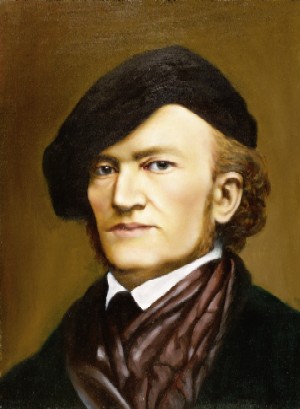
The program will focus on examining the change that came about with
Lohengrin which I consider to be a major turning point in
Wagner’s operatic output. Examples from the pre-Romantic period
as well as from the Romantic or middle period will lead to a more
detailed look at Lohengrin as the precursor of the great
music dramas to come.
(js&ta/js&ta)
|
Summer Season
|
Please note that summer programs are Saturdays at 7:00 P.M.
|
|
| Sat |
Jun |
15 |
7:00 |
Duo Pianos
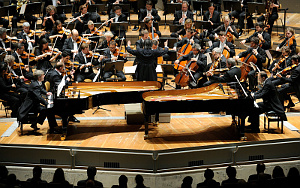
The piano is such a powerfully expressive instrument that it can create
a universe all on its own. A chamber ensemble can be fundamentally
changed as soon as a piano joins the team. Sometimes it takes a
string quartet to withstand a single piano. Even an orchestra can
be reformed by having a piano in it. When this musical giant teams
up together with another partner of its own kind, again they depart
in a totally different direction from a simple solo piano recital.
Together they can conjure up a unique world which can be filled
with inter-relationships, battles, friendships, and diversity.
Our program reveals the rich world of the piano duo through the
recordings of Perahia & Lupu, Friedrich Gulda & Chick Corea,
and the beautiful Labèque sisters (who are visiting us
very soon in the Toronto Summer Music Festival).
http://www.torontosummermusic.com/
(js&ta/ta&js)
|
| Sun |
Jun |
30 |
All day |
Pride Day 2013 CMC Booth
|
| | | |
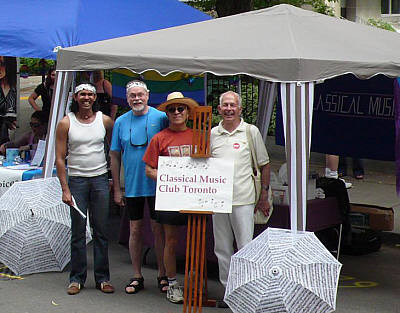
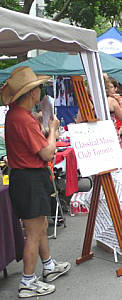

Drop by our club´s booth on Pride Day, June 30, 2013
We´re with the community organisations
Club members will be there to answer your questions
And we will have some previously enjoyed CDs for sale.
Pride Toronto Official Web site
|
| Sat |
Jul |
13 |
7:00 |
Aida
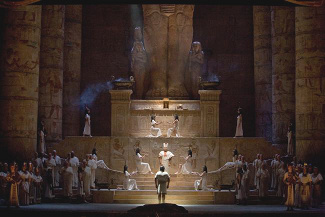
On the Egyptian banner-holder’s masculine arm his golden bracelet
shines against the cobalt-blue desert sky. “Aida trumpets”
soar up to the stone columns and pyramids …Technicolor-Hollywood
campiness is one side of the excitement of Verdi’s opera Aida.
But Aida is such a unique opera which was composed on an original
libretto; there were no historical incidents, no legends, no theatre plays
behind this opera. The entire tale of Aida was the result of a
leap of imagination, pure fantasy inspired by two human skulls unearthed
together in an Egyptian ruin. The fantasy created by European sensitivity
of the 19th century expands the meaning
of the masterpiece timelessly to a universal anti-war message.
When the opera proceeds to Acts 3 and 4, the most heartbreaking, truthful
cries of war victims in any art form can be heard and the beauty of
humanity conquering the dilemmas of war is accomplished in pianissimi.
Aida magically invites to submit to the heat of a summer evening.
(js/ta)
|
| Sat |
Aug |
17 |
7:00 |
Pinchas & the Violin (Part 4)
Experience some of the greatest music ever written for the violin
through the ears of one of the finest violinits of our time as Pinchas
Zukerman gives studio demonstrations and discusses these works with
Eric Friesen.
In this series of five programs, each program will feature two
one-hour presentations. In the first half of Program 4 we will hear
the Alban Berg Violin Concerto - To the Memory of an Angel, first
movement part one, played by Philippe Hirshhorn, violin, Pierre Bartholomée
conductor with the Orchestre Philharmonique de Liege; first movement
complete played by Pinchas Zukerman, violin, Pierre Boulez conductor with
the London Symphony Orchestra; second part opening, played by
Pinchas Zukerman, violin, Pierre Boulez conductor with the London
Symphony Orchestra; second movement complete played by Pinchas Zukerman, violin,
Pierre Boulez conductor with the London Symphony Orchestra.

After the break, we will hear the Elgar Violin Concerto, Opus 61,
first movement partial played by Yehudi Menuhin, violin, Sir Edward
Elgar conducting with the London Symphony Orchestra in an historic 1932
recording; second movement played by Pinchas Zukerman, violin,
Daniel Barenboim conductor with the London Philharmonic Orchestra;
third movement played by Pinchas zukerman, violin, Leonard Slatkin
conductor with the Saint Louis Symphony Orchestra.
(bc/bs)
|
|

